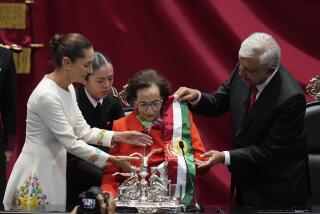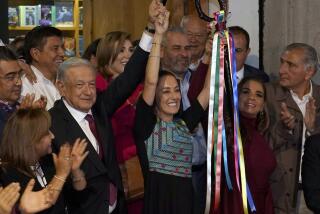Last of Perons Quitting Party : Resignation Letter Sent by Widow of Dictator
- Share via
BUENOS AIRES — Confronted by a bitter internal struggle among her erstwhile followers, the last of the Perons has apparently bowed out of Argentine politics.
Leaders of of two Peronist feuding factions said Thursday that they have received a handwritten letter from Maria Estela Peron announcing her “irrevocable resignation” as leader of the diffuse, labor-based political movement founded more than 40 years ago by her late husband, Juan D. Peron.
Written from her self-imposed exile in Madrid on Feb. 4, her 54th birthday, the letter was addressed to leaders of both wings of the movement, which splintered earlier this month.
Statements attributed to her in the past have occasionally proved to be apocryphal, but leaders of Peronism’s so-called official wing said Thursday that they are certain that the letter--hand-delivered and on Maria Estela Peron’s personal stationery--is genuine. Peronist dissident leaders, who constitute a majority within the movement’s Justicialist Party, did not challenge the letter, but they said they will seek to verify its authenticity.
The aloof Peron, who succeeded her husband as president on his death in 1974 and was ousted by a military coup in March, 1976, had remained Peronism’s titular leader from exile without ever exercising day-to-day control.
A former cabaret dancer who became Juan Peron’s third wife in 1961, “Isabelita,” as she is known here, never matched Peron’s second wife, Eva, in ambition, political savvy or admiration among Argentine workers. Her unmatchable attraction, though, was her name. She is the last Peron.
The Peronists, who had dominated Argentine political life since the 1940s, are still smarting from their election defeat in 1983 by now-President Raul Alfonsin. However, so strong is the lingering attraction of the Peron name that when the party splintered in the first days of this month, both factions elected Maria Estela Peron as president of their rival executive councils. Both sought her support. She made no public response.
Thursday’s letter was apparently her rejoinder to the party’s fissure, which is seen as both internally destructive and potentially unsettling for Argentina’s young democracy in its larger context.
No Alfonsin Opposition
The Peronist split means that Alfonsin has no coherent, major civilian opposition in a Congress where the Peronists constitute the majority in the Senate and the largest minority in the lower house. Some prominent Alfonsin supporters fear that the political tumult will provide ammunition for right-wingers who insinuate that democracy is a failure and that a strong military hand is needed “to restore order.”
The setting for Maria Estela Peron’s apparent withdrawal is an internal battle royal complete with insults and lawsuits over which faction should have the right to Peronist symbols and property.
On the one side are the hard-line, self-styled “official” Peronists headed by Herminio Iglesias, a defeated candidate for governor of Buenos Aires province, and Lorenzo Miguel, a union leader. They are identified with old-style, autocratic rule of the sort Peron himself used to impose.
Lean to Internal Democracy
The Peronist dissidents, led by a federal senator from San Luis province named Oraldo Britos, are more inclined toward internal democracy, calling for renewal of party authorities through one-man, one-vote elections.
The dissidents blame Iglesias, Miguel and their supporters for the 1983 election defeat. They say the party needs new leadership if it is to have an effective future.
Prominent dissident leaders, including 11 of Argentina’s 12 Peronist provincial governors, won elections in 1983. Meanwhile, Peronism’s presidential candidate--and Iglesias himself--were losing. It is intolerable, the dissidents say, that the winners should be frustrated in their search for party leadership by losers wielding a stacked deck.
Peronism’s political obituary has been written--prematurely--many times. In the past, though, the disenchanted have simply left the party, or have been quarantined into political activity. Never before has there been a split as openly and angrily divisive as the present one. And never before has there not been a Peron leading the movement.
More to Read
Sign up for Essential California
The most important California stories and recommendations in your inbox every morning.
You may occasionally receive promotional content from the Los Angeles Times.













